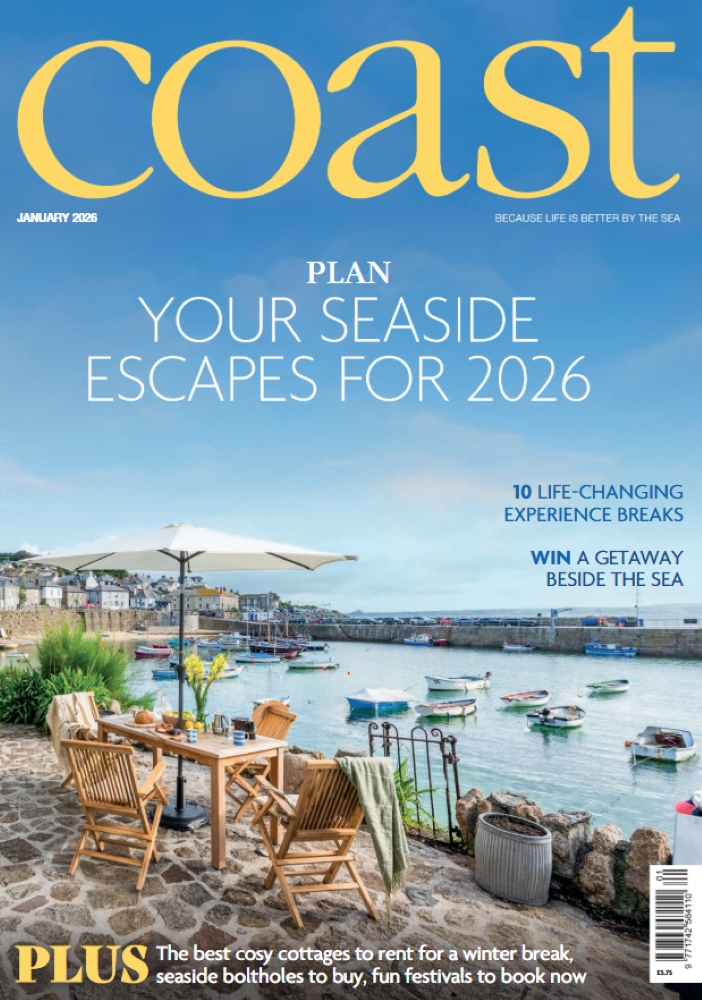With gale force winds blowing offshore as the dawn breaks, three surfers brave the wild waves at Pentewan Beach on Cornwall’s south coast, surrounded by cormorants diving for fish and a lone seal bobbing about. After catching a few waves, one of the surfers, Hugo Tagholm, picks up a handful of plastic as he walks back up the beach – a water bottle and some cutlery. ‘This connection with nature is such a privilege but there’s always plastic on any British Isles beach and removing some of it is my thanks to Mother Ocean,’ he says.
As chief executive of the Cornwall-based charity, Surfers Against Sewage (SAS), Hugo is on a mission to put a stop to this tide of plastic pollution with the Plastic Free Coastline (PFC) communities initiative, which launched in August 2017. So far, so good – the campaign has really captured people’s imaginations. ‘We’re delighted about how the community project is taking off, it’s empowering people and inspiring them to make change happen,’ says Hugo, who leads a huge army of volunteers intent on clearing up ocean plastic, from straws and cutlery to coffee cups, bottles and those tiny plastic beads that wash up with the flotsam and jetsam.
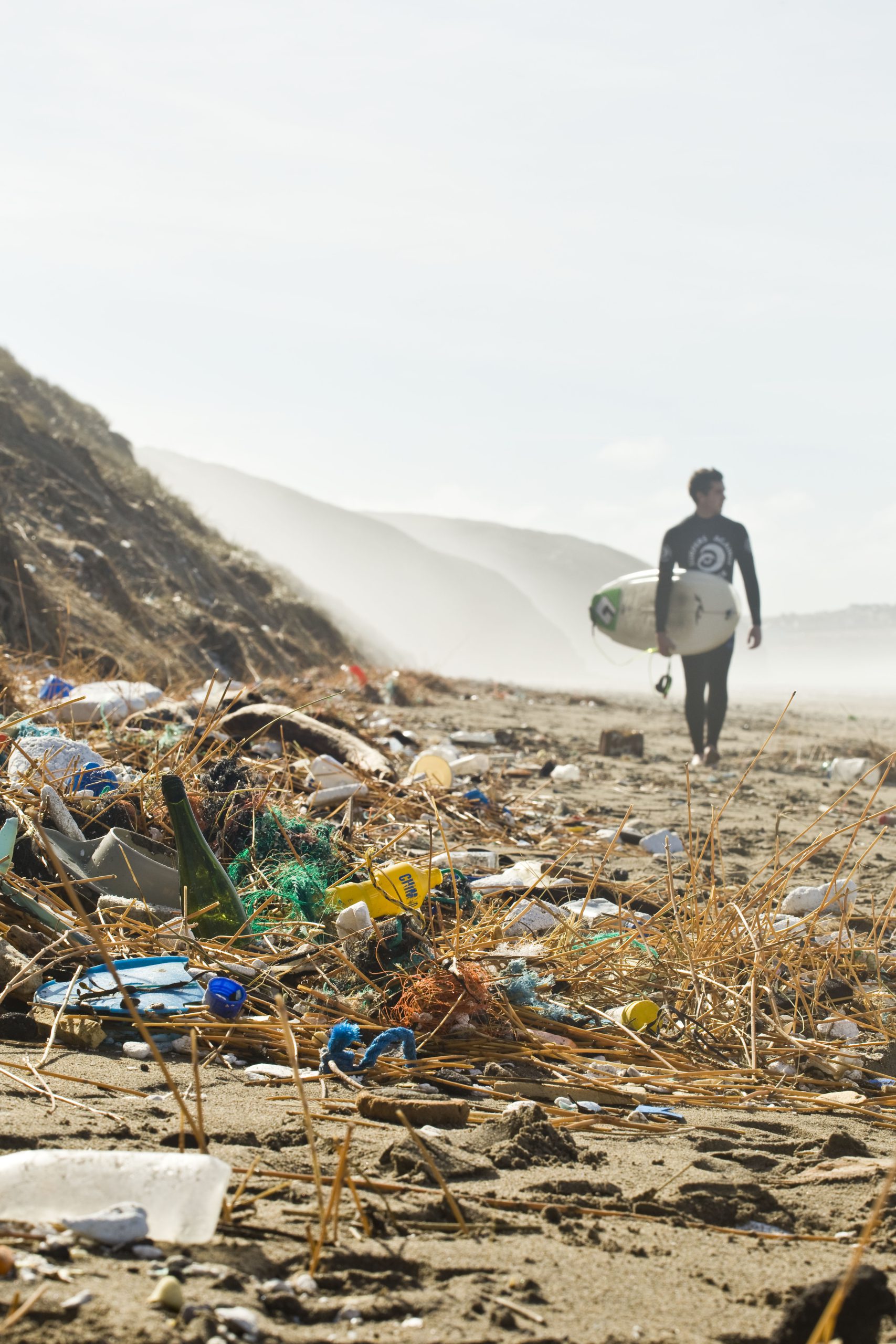
TRASH TIPPING POINT
SAS is one of the UK’s biggest single beach clean groups but even with more than 75,000 volunteers cleaning beaches nationwide, Hugo realises we can’t simply litter-pick our way out of this problem. ‘In all honesty, the extent of single-use plastic waste is akin to an oil spill across our beaches. We’ll never be able to pick up plastic litter as fast as factories produce it, so we need to engage people to stop the flow of single-use plastics and other plastics onto our beaches. The PFC communities campaign is the vehicle for us to communicate that,’ he says.
Today, hundreds of campaign champions – including watersports enthusiasts, teachers and vets – are working hard to reduce the use of single-use plastics in more than 300 cities, towns and villages in the UK and internationally. ‘From the tip of Scotland right down to Land’s End and from Northern Ireland across to East Anglia, these are people who want to make a difference as part of this plastic-free movement,’ adds Hugo.
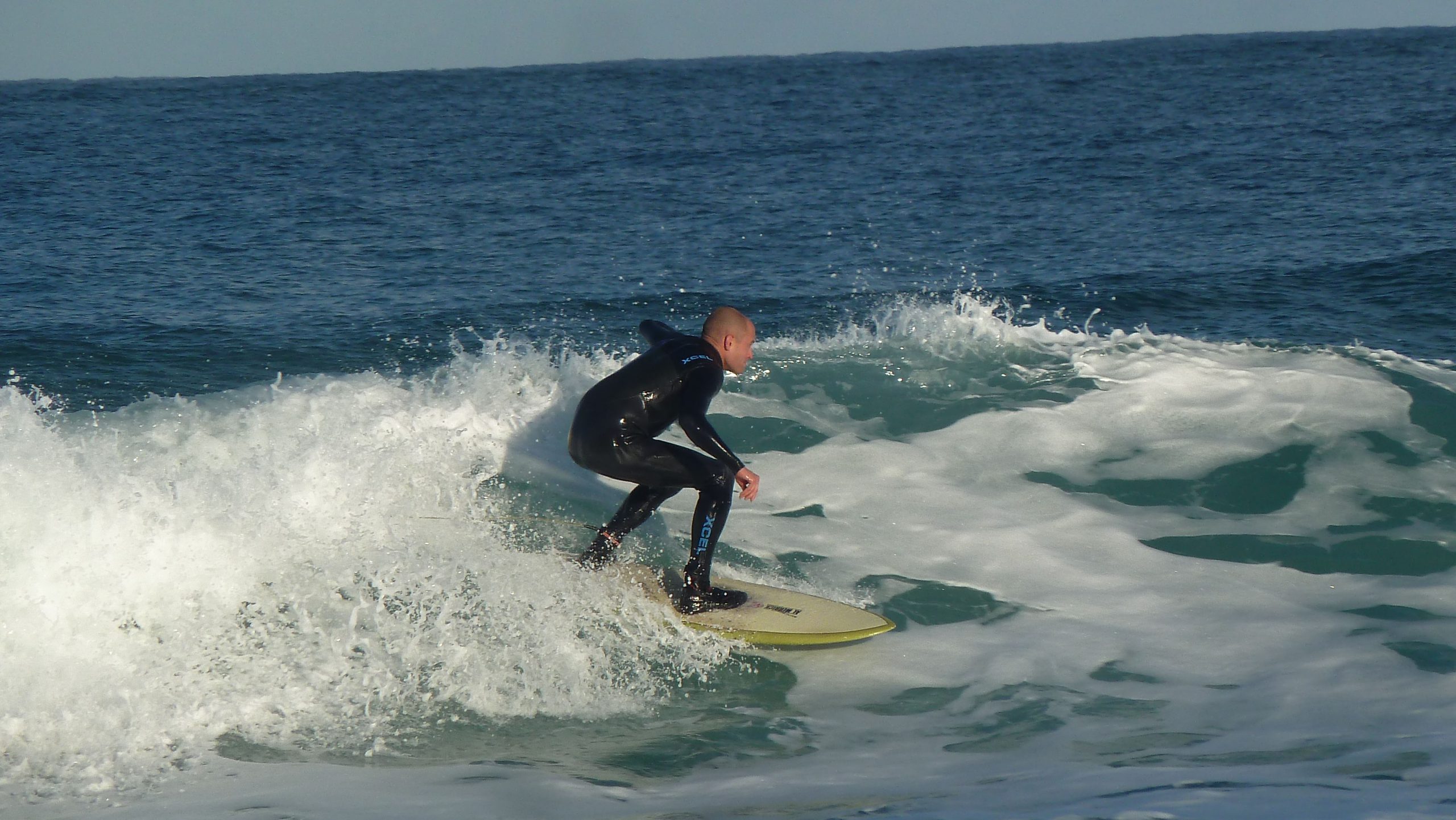
Inspired by the Fairtrade model and the grassroots Transition Towns network, the SAS campaign encourages councils, businesses, schools and individuals to stop providing throwaway plastic items and offer sustainable alternatives instead. In December 2017, Penzance became the first town to achieve PFC status by doing this – organising beach cleans, setting up a steering group, and with the council pledging to support all plastic-free initiatives in the area. Now, 25 places are approved and more than 300 are working towards plastic-free status. Truro was recently announced as the first city. ‘More people are beginning to feel a sense of shame about the amount of single-use plastic that ends up in the ground or in oceans for hundreds of years. This is solvable, we’re on the cusp of something great,’ says Hugo optimistically.
TAKING A STAND
The grassroots support is everything to the PFC initiative. Back in 2016 vet Cal Major paddleboarded around the entire Cornish coast to increase awareness about ocean plastic and raise money for SAS. Now she heads up a team of six volunteers running
the North Devon PFC communities campaign. ‘We need to start justifying every item of plastic we use. SAS gives us a strong framework and by getting bigger businesses on board, we can effect bigger change,’ says Cal. She has been overwhelmed with the response from people wanting to get involved: ‘It’s a massive community effort. Everyone has a part to play and that’s really something to be proud of.’
She organises SUP cleans on the Taw-Torridge estuary near her home in Bideford: ‘It’s one of the beautiful ways of opening people’s eyes to the problem and there’s a real togetherness that comes with that.’ Cal feels positive about the possibility to make a change: ‘We can all do something to protect our planet. No one wants plastics to be an eyesore, especially in a tourist destination like this. Hopefully people will feel excited to shop in a PFC communities shop or ask for a free refill for their water bottle – it’s so important people feel pride in this.’ As consumers, we can all change the plastic pollution problem daily through simple choices, wherever we live.
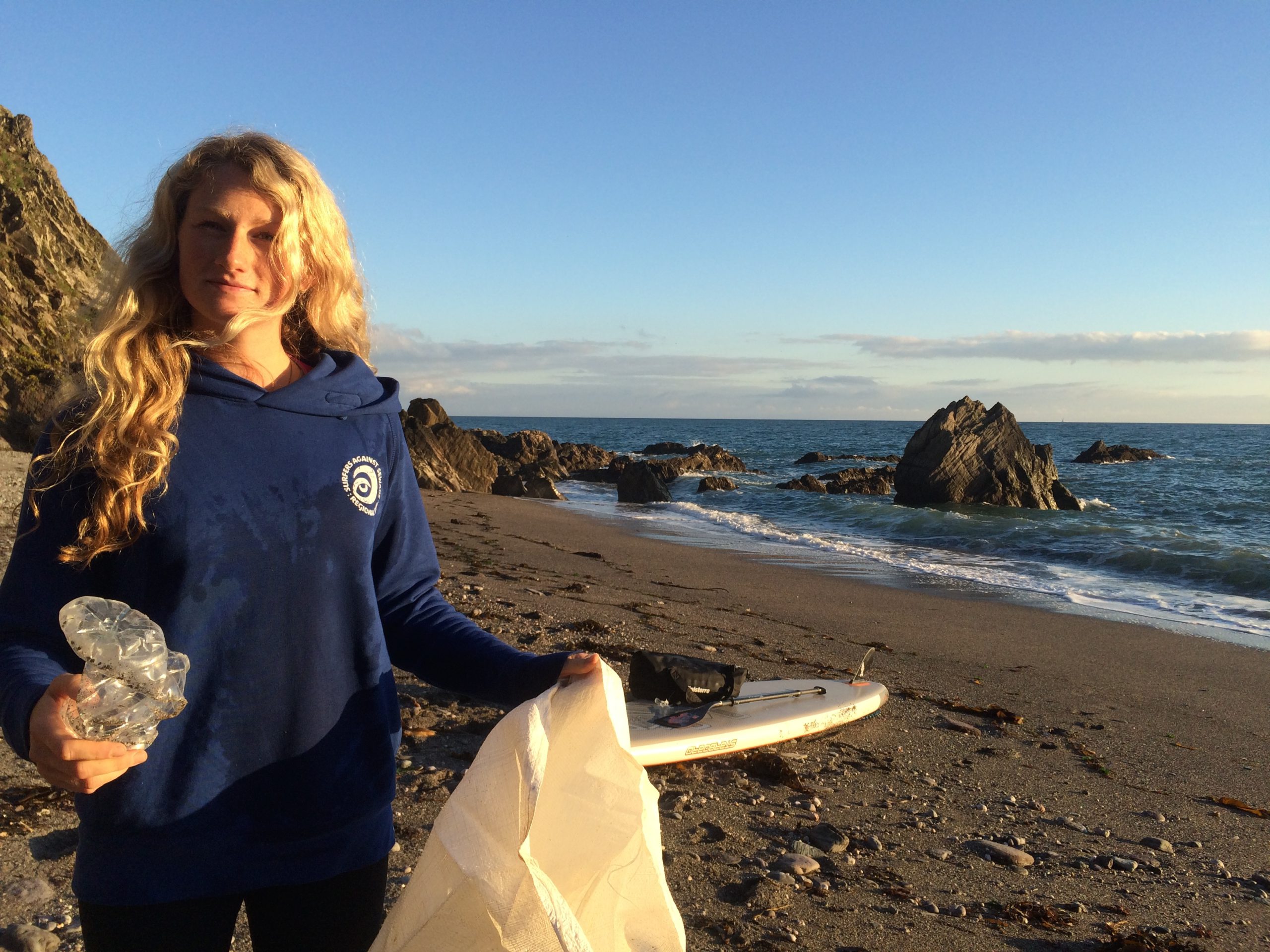
FEELING PROTECTIVE
In the tiny Welsh village of Amroth, Anna Strezelecki and her 12-year-old daughter Jaz started cleaning beaches seven years ago. ‘As SAS reps for South Pembrokeshire, we organise regular beach cleans at Amroth and Freshwater West, and encourage schools, cafés, pubs and businesses to ditch single-use plastic,’ explains Anna, a surf-wear designer who is converting an old VW van into a beach clean hub so the duo can run art workshops using beach litter to raise awareness. ‘This just feels like the right thing to do; we surf, swim, paddleboard, play in the sea and on the beaches – who wants to be doing that if it’s full of rubbish?’ Jaz, who has grown up here, hopes to become a marine conservationist. ‘She’s understood from an early age that animals and fish get harmed from ingesting or getting caught in rubbish created by humans. Protecting our coastal environment so marine wildlife can thrive and we can all enjoy the beauty is so important.’
As Jacques Cousteau famously said, ‘People protect what they love’, and SAS’s Hugo Tagholm believes that the issue of plastic pollution is at the forefront of many people’s minds. ‘This enigmatic, beautiful, aspirational environment is what has made plastic litter such a topical issue. Thankfully, SAS has been intimately connected with the ocean for 30 years and our members and supporters live and breathe the sea. They see these problems first-hand, they are the ones walking across tidelines of plastic pollution, picking up throwaway plastics from our beaches, surfing and swimming and walking their dogs on the beach.’ Ultimately, we all wish for a greener and bluer future.
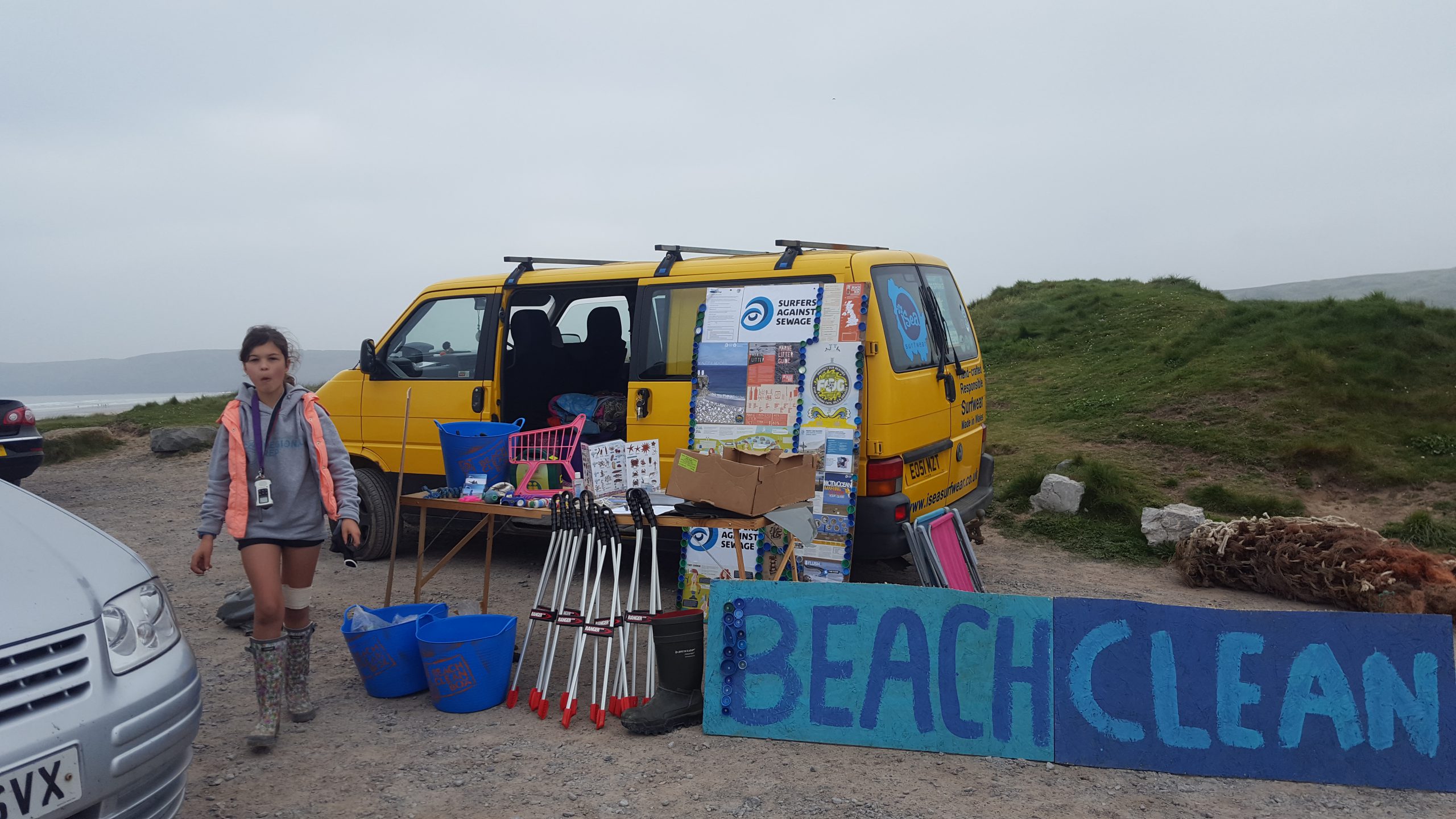
Make a donation to help protect you oceans from plastic here www.sas.org.uk
Rowing to raise funds
Four Exeter rowers are training to undertake a 3,400-mile ‘Row for the Ocean’ from the Canary Isle of La Gomera to Antigua in a bid to raise £60k for PFC communities. Kirsty Barker, Rosalind Holsgrove-West, Kate Salmon and Laura Try met while rowing eights on Exeter’s canals, near the South Devon coast. ‘We’re flat-water rowers so we will be getting lots of ocean-rowing experience out to sea from Exmouth, down the coast and across to the Isles of Scilly.’ The women set off in December, and will row two-hour shifts for more than 70 days in extreme conditions with up to 40-knot winds and 20-30ft waves. They hope to make Exeter plastic-free by 2020: ‘We wanted to do more than fundraising for SAS, as our legacy we want to make a small difference in changing the place we live too.’ rowfortheocean.co.uk
With gale force winds blowing offshore as the dawn breaks, three surfers brave the wild waves at Pentewan Beach on Cornwall’s south coast, surrounded by cormorants diving for fish and a lone seal bobbing about. After catching a few waves, one of the surfers, Hugo Tagholm, picks up a handful of plastic as he walks back up the beach – a water bottle and some cutlery. ‘This connection with nature is such a privilege but there’s always plastic on any British Isles beach and removing some of it is my thanks to Mother Ocean,’ he says.
As chief executive of the Cornwall-based charity, Surfers Against Sewage (SAS), Hugo is on a mission to put a stop to this tide of plastic pollution with the Plastic Free Coastline (PFC) communities initiative, which launched in August 2017. So far, so good – the campaign has really captured people’s imaginations. ‘We’re delighted about how the community project is taking off, it’s empowering people and inspiring them to make change happen,’ says Hugo, who leads a huge army of volunteers intent on clearing up ocean plastic, from straws and cutlery to coffee cups, bottles and those tiny plastic beads that wash up with the flotsam and jetsam.

TRASH TIPPING POINT
SAS is one of the UK’s biggest single beach clean groups but even with more than 75,000 volunteers cleaning beaches nationwide, Hugo realises we can’t simply litter-pick our way out of this problem. ‘In all honesty, the extent of single-use plastic waste is akin to an oil spill across our beaches. We’ll never be able to pick up plastic litter as fast as factories produce it, so we need to engage people to stop the flow of single-use plastics and other plastics onto our beaches. The PFC communities campaign is the vehicle for us to communicate that,’ he says.
Today, hundreds of campaign champions – including watersports enthusiasts, teachers and vets – are working hard to reduce the use of single-use plastics in more than 300 cities, towns and villages in the UK and internationally. ‘From the tip of Scotland right down to Land’s End and from Northern Ireland across to East Anglia, these are people who want to make a difference as part of this plastic-free movement,’ adds Hugo.

Inspired by the Fairtrade model and the grassroots Transition Towns network, the SAS campaign encourages councils, businesses, schools and individuals to stop providing throwaway plastic items and offer sustainable alternatives instead. In December 2017, Penzance became the first town to achieve PFC status by doing this – organising beach cleans, setting up a steering group, and with the council pledging to support all plastic-free initiatives in the area. Now, 25 places are approved and more than 300 are working towards plastic-free status. Truro was recently announced as the first city. ‘More people are beginning to feel a sense of shame about the amount of single-use plastic that ends up in the ground or in oceans for hundreds of years. This is solvable, we’re on the cusp of something great,’ says Hugo optimistically.
TAKING A STAND
The grassroots support is everything to the PFC initiative. Back in 2016 vet Cal Major paddleboarded around the entire Cornish coast to increase awareness about ocean plastic and raise money for SAS. Now she heads up a team of six volunteers running
the North Devon PFC communities campaign. ‘We need to start justifying every item of plastic we use. SAS gives us a strong framework and by getting bigger businesses on board, we can effect bigger change,’ says Cal. She has been overwhelmed with the response from people wanting to get involved: ‘It’s a massive community effort. Everyone has a part to play and that’s really something to be proud of.’
She organises SUP cleans on the Taw-Torridge estuary near her home in Bideford: ‘It’s one of the beautiful ways of opening people’s eyes to the problem and there’s a real togetherness that comes with that.’ Cal feels positive about the possibility to make a change: ‘We can all do something to protect our planet. No one wants plastics to be an eyesore, especially in a tourist destination like this. Hopefully people will feel excited to shop in a PFC communities shop or ask for a free refill for their water bottle – it’s so important people feel pride in this.’ As consumers, we can all change the plastic pollution problem daily through simple choices, wherever we live.

FEELING PROTECTIVE
In the tiny Welsh village of Amroth, Anna Strezelecki and her 12-year-old daughter Jaz started cleaning beaches seven years ago. ‘As SAS reps for South Pembrokeshire, we organise regular beach cleans at Amroth and Freshwater West, and encourage schools, cafés, pubs and businesses to ditch single-use plastic,’ explains Anna, a surf-wear designer who is converting an old VW van into a beach clean hub so the duo can run art workshops using beach litter to raise awareness. ‘This just feels like the right thing to do; we surf, swim, paddleboard, play in the sea and on the beaches – who wants to be doing that if it’s full of rubbish?’ Jaz, who has grown up here, hopes to become a marine conservationist. ‘She’s understood from an early age that animals and fish get harmed from ingesting or getting caught in rubbish created by humans. Protecting our coastal environment so marine wildlife can thrive and we can all enjoy the beauty is so important.’
As Jacques Cousteau famously said, ‘People protect what they love’, and SAS’s Hugo Tagholm believes that the issue of plastic pollution is at the forefront of many people’s minds. ‘This enigmatic, beautiful, aspirational environment is what has made plastic litter such a topical issue. Thankfully, SAS has been intimately connected with the ocean for 30 years and our members and supporters live and breathe the sea. They see these problems first-hand, they are the ones walking across tidelines of plastic pollution, picking up throwaway plastics from our beaches, surfing and swimming and walking their dogs on the beach.’ Ultimately, we all wish for a greener and bluer future.

Make a donation to help protect you oceans from plastic here www.sas.org.uk
Rowing to raise funds
Four Exeter rowers are training to undertake a 3,400-mile ‘Row for the Ocean’ from the Canary Isle of La Gomera to Antigua in a bid to raise £60k for PFC communities. Kirsty Barker, Rosalind Holsgrove-West, Kate Salmon and Laura Try met while rowing eights on Exeter’s canals, near the South Devon coast. ‘We’re flat-water rowers so we will be getting lots of ocean-rowing experience out to sea from Exmouth, down the coast and across to the Isles of Scilly.’ The women set off in December, and will row two-hour shifts for more than 70 days in extreme conditions with up to 40-knot winds and 20-30ft waves. They hope to make Exeter plastic-free by 2020: ‘We wanted to do more than fundraising for SAS, as our legacy we want to make a small difference in changing the place we live too.’ rowfortheocean.co.uk













